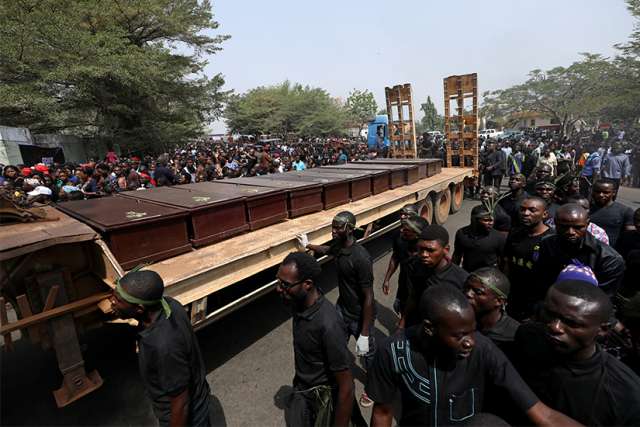Men march along a truck Jan. 11 carrying the coffins of people killed by Fulani herdsmen in Makurdi, Nigeria. With at least 80 people killed since the start of the year in conflict over fertile land in Nigeria, the nation's bishops condemned what they call brutal massacres of innocent people.
CNS photo/Afolabi Sotunde, Reuters
Developing a global conscience with the 'Share Lent' campaign
By Glen Argan
The disciplines of Lent — prayer, fasting and almsgiving — are an exercise in conscience formation. Lent is much more than conscience formation, but it is that.
Likely, however, most adult Catholics believe our consciences are already well formed. We know the difference between right and wrong, and most often we do the right thing.
Yet, ours is a complex world. Economic globalization and climate change make us complicit in activities taking place half a world away as well as in our own neighbourhood. We have a moral responsibility to respond, not only to the poor person nearby, but also to the poor on other continents.
That’s why Development and Peace’s Share Lent campaign is so important. If we pay attention, our consciences can be shaped to reduce our indifference to the global poor. In the global village, our consciences must also become global.
The mini-magazine for this year’s Share Lent campaign tells the stories of four grassroots projects in developing nations funded by Canadian Catholics through D&P.
The story that struck me the most is that of the Social and Economic Rights Action Centre (SERAC) in Lagos, Nigeria. SERAC empowers local communities in Lagos with tools to dialogue with government over the issue of forced evictions. For 30 years, the government has been forcibly destroying communities of impoverished people along the shoreline in Lagos. The goal is to drive out the poor for luxury housing, upscale hotels and office buildings.
Between 2000 and 2009, Nigerian authorities evicted more than two million people. A November 2017 report by Amnesty International details one series of forced evictions. They began in March 2016 when local police and bulldozers drove 30,000 people out of the affected area. Eleven people died, at least one hit by a police bullet while others drowned running from the gunfire.
Another armed eviction of those who remained took place in November 2016 and still another in March 2017, despite court orders prohibiting such action. State security forces and “unidentified men” used machetes, axes, guns, tear gas and bulldozers to burn and destroy people’s homes. No compensation was given to the people evicted and no arrangements were made for alternative housing.
The government first denied involvement in the evictions, then later said the evictions were necessary to protect people from environmental pollution. A month after that, it said its goal was to root out militants and illegal immigrants.
One might question whether SERAC’s response goes far enough. Does training for dialogue provide adequate defence for impoverished people against a government determined to evict them using violent means? Shouldn’t the organization at least lead the people to demonstrate against the repression they face and to adopt means of non-violent resistance?
It’s a reasonable question. But Development and Peace is about supporting local groups that work for long-term solutions which will peacefully end repression and strengthen the fabric of society.
In Canada, D&P’s work centres on education — the formation of a global conscience among Canadian Catholics. In Lent, such education is combined with fundraising through the Share Lent campaign supported by the country’s bishops. In many dioceses you can support Development and Peace financially by contributing to the Share Lent collection on March 18. You can also donate online through devp.org/give, or contribute monthly through devp.org/shareyearround.
The largest response to D&P fundraising appeals comes when a natural disaster strikes some part of the developing world. We are right to respond to such emergency appeals. So too, however, should we offer long-term support for grassroots organizations in developing nations.
Last summer, I was part of a D&P solidarity tour to Bolivia which visited local groups whose activities D&P supports. One person told us, “What you do changes lives.” It was a clear affirmation of the positive effect Canadian Catholics are having half a world away.
(Glen Argan lives in Edmonton and is the interim editor of Living with Christ.)
Tagged under:
Please support The Catholic Register
Unlike many media companies, The Catholic Register has never charged readers for access to the news and information on our website. We want to keep our award-winning journalism as widely available as possible. But we need your help.
For more than 125 years, The Register has been a trusted source of faith-based journalism. By making even a small donation you help ensure our future as an important voice in the Catholic Church. If you support the mission of Catholic journalism, please donate today. Thank you.
DONATE

